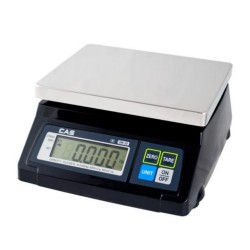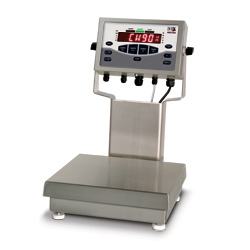The impact of weight scales for organics recycling and compost manufacturing is critical to the success of any sustainability initiative. Users searching for the right scales are typically looking to refine accuracy, manage waste volumes, and ensure the quality of the compost produced.
This article delves into the key roles these weighing scales play in the industry, from smaller kitchen compost setups to large-scale operations, shedding light on their essential contribution to an accurate eco-friendly composting process.
Important Points
-
Organics recycling includes home, community, and industrial composting, each serving different levels of organic waste management, with industrial composting playing a crucial role in urban waste management strategies.
-
Lots of industries use scales throughout production. In organics recycling and compost manufacturing, weight plays an important role from waste inventory tracking and maintenance, to waste disposal and sustainable initiatives. Weighing and process-control equipment help waste-industry businesses improve overall efficiency.
-
Composting transforms organic waste into a resource that improves soil fertility and supports sustainable agriculture, while innovations in composting equipment and data-driven operations enhance the efficiency and quality of the compost production process.
Understanding the Spectrum of Organics Recycling
There are various methods of managing organic waste, each with its own advantages and challenges. Organics recycling includes three main techniques: home composting for individual use, industrial composting on a larger scale, and community composting as a collective effort to make an impact at the local level.
These approaches play an essential role in promoting eco-friendly practices by transforming organic waste into valuable material like compost. Some examples of what can be turned into nutrient-rich soil through this process include food scraps, garden waste, food soiled paper and grass clippings.
By choosing to engage in any form of organic recycling such as these mentioned above, you have the power to contribute towards an economy that values sustainability. Converting materials like kitchen leftovers or lawn trimmings into usable resources for enriching soil fertility makes your efforts impactful both locally within your community and globally overall.
Home Composting: A Personal Approach
Home composting is a straightforward and effective method for managing organic waste at home. It involves an aerobic process that naturally breaks down food scraps and garden waste into nutrient-rich soil amendments.
The success of home composting relies on maintaining the right balance of four elements: carbon-rich “browns,” nitrogen-rich “greens,” water, and air. These components create ideal conditions for microorganisms to facilitate the composting process. One example of this technique is worm farming, which uses worms to break down food scraps and food waste resulting in high-quality soil amendment.
Aside from reducing household waste, home composting also has positive effects on mitigating climate change by improving soil health. By diverting organic materials away from landfills where they release methane gas as they decompose without oxygen present.
To be beneficial for our environment, such practices provide us with another way we can turn what would otherwise become “waste” or leftovers back into productive material. Hence showing how sustainable it could be if everyone embraced simple acts like these.

This natural process not only helps reduce overall landfill volume, but also has added benefits such as lowering pollution, oil spills, and other negative environmental impacts associated with traditional methods used when disposing unwanted foods. For home applications, a CAS SW-1 bench scale is a versatile scale that can be used for multiple daily tasks.
Community Composting: Collective Effort for Local Impact
Community composting is a successful alternative for managing organic waste, providing opportunities for community involvement and education, which are crucial to its effectiveness. This method can be quickly implemented and offers support for broader urban initiatives that aim to recover food scraps.
The main principles of community composting include reducing waste by returning organic materials back into the soil within local areas in line with the goals of the community, promoting social engagement, and empowering residents at a grassroots level. Contributing towards greener neighborhoods, as well as diverting these valuable resources away from disposal sites.
Overall, not only does this sustainable practice benefit both the environment and society, but it also facilitates closer connections between individuals within communities while working towards common objectives such as minimizing waste generation through appropriate management of organic materials.
Industrial Composting: Large-Scale Solutions for Organic Waste
Large-scale composting facilities play a vital role in managing organic waste on a large scale. They have the capacity to handle significant amounts of organic materials, making them essential for waste management in densely populated urban areas.
The implementation of laws and regulations that limit or forbid landfill disposal of organic waste has highlighted the need for industrial composting solutions. As these measures affect all types of producers, there has been an increase in the development of expansive composting facilities designed to efficiently manage substantial volumes of such material.

Industrial locations can easily benefit by adding Mettler Toledo shipping scales, Rice Lake bench scales and check weighing equipment, and Roughdeck floor scales for accurate weighing of various items everyday.
The Engineering Behind Compost Manufacturing
Various advanced composting systems and engineered processes play a crucial role in the conversion of organic waste into valuable compost. Contemporary composting facilities utilize technologies such as biofilters, aeration systems, and computer monitoring to optimize the process.
The design of these facilities is determined by several factors including but not limited to: incoming volume of organic waste, technology utilized, necessary equipment and potential future growth considerations. These aspects have an impact on physical, biological, and chemical changes that take place during the transformation of organic waste into stable compost.
To facilitate the creation of high-quality compost from different types of materials found inorganic waste, various innovative techniques are integrated into modern composting facilities to achieve optimum results. These include incorporating aeration systems, biofilters and monitors for efficient management throughout the entire process. This ensures successful conversion of waste materials into usable compost within a controlled environment.
Moisture Management Techniques
Maintaining an appropriate level of moisture is crucial for successful composting. This helps to facilitate microbial activity while also ensuring proper aeration, which is necessary for the process.
To regulate the moisture content in compost, one can incorporate materials like leafy browns and additives or bulking agents that affect levels of water. Efficient management of moisture involves regularly monitoring the interior of piles, optimizing their size and shape, and utilizing covers throughout all stages of the composting process.
From Food Scraps to Soil Fertility: The Composting Process
Composting is a highly effective process that transforms organic waste into a valuable resource for improving soil fertility. It involves several stages, including initial decomposition, secondary breakdown, finishing and curing.
Typically used inputs for composting include high nitrogen materials like food scraps and manures, as well as high carbon materials such as leaves and wood chips. Creating the perfect compost recipe is crucial. It requires careful calculation of moisture levels and achieving the right balance of carbon to nitrogen in order to facilitate optimal conditions for decomposition.
Collection and Preparation of Organic Materials
The start of the composting process involves collecting and preparing organic materials. There are various options for containers at home, such as bins or reusing items like coffee cans or ice cream pails.
Preparation of organic materials includes ensuring that they have a suitable moisture content (40-60%) and particle size (1/8 – 2 inches) to facilitate microbial processes without impeding proper airflow.
The Biological Breakdown
The breakdown of organic matter in compost, also known as the biological breakdown phase, is initiated by mesophilic microbes. These microorganisms break down easily degradable compounds and cause a temperature increase that signals the transition to the thermophilic stage. At this point, there can be over 10 billion microbial populations per gram of compost.
During this stage, proteins in the compost decompose into ammonia, which results in nitrogen being lost through volatilization. Bacteria then continue their work by breaking down more complex carbon forms such as cellulose.
As aerobic decomposition progresses, humus (an important stable organic compound) is formed along with other byproducts like carbon dioxide and heat from water molecules’ release during degradation processes within rapidly growing bacterial communities present on various surfaces throughout your pile’s interior systems!
Curing and Quality Assurance
The final stage of the composting process involves both curing and quality assurance. After several months of biological activity, the compost enters a maturation phase where it stabilizes thanks to an increase in higher-level organisms.
Quality assurance for compost focuses on achieving a low contamination rate. During curing, maintaining uniform moisture through top wetting and re-mixing in forced aeration systems can help prevent any issues with non-contamination. Stable bacterial populations during this process promote the growth of nematodes and other helpful organisms that contribute to soil fertility.
The Economy of Organics Recycling
To its positive impact on the environment, organic recycling is also a significant contributor to economic growth. It is essential for cities to implement curbside or drop-off programs in order to divert valuable organic materials from landfills and reduce their volume as well as associated methane emissions.
Organic waste can be recycled through various methods such as converting food scraps into animal feed or composting it for nutrient-rich soil amendments. These practices not only improve soil fertility, but also support sustainable agriculture by reducing factors that contribute towards soil degradation like erosion. Organics recycling aligns with environmental priorities and promotes the shift from a linear waste system towards a more well rounded approach.
Reducing Methane Emissions from Landfills
The breakdown of organic waste in landfills creates leachate, which pollutes water and produces methane emissions. These potent greenhouse gases can be reduced by diverting organic materials into an economy that travels full circle instead of sending them to landfills.
In the United States alone, around 38 million tons of food scraps were generated in 2014. Despite this significant amount, only about five percent was recycled or reused. This highlights the potential for preventing strong greenhouse gas emissions like methane through initiatives that aim to reduce wasted food and promote organics recycling.
Supporting Sustainable Food Production
Sustainable food production benefits from organics recycling in numerous ways. Compost improves soil health by providing a rich source of nutrients, including nitrogen, phosphorus, and potassium, which are essential for plant growth.
The application of compost in place of synthetic pesticides and chemical fertilizers can have several benefits, including:
-
Decreasing production costs for farmers
-
Promoting sustainable agricultural methods
-
Reinforcing food security
-
Enhancing food taste and nutritional value, as healthier soils foster produce rich in micronutrients.
Composting has aligned with sustainable agriculture and is a valuable practice for farmers to adopt.
Innovations in Composting Equipment
Advancements in composting equipment, such as automated sorting systems and precise aeration technologies, have greatly improved the efficiency and standard of producing high-quality compost.
In order to achieve an optimal end product, facilities now utilize automated sorting lines that effectively separate contaminants from organic waste during the composting process. This allows for a more efficient breakdown of materials while ensuring superior quality. Precision aeration systems are implemented to maintain necessary oxygen levels for aerobic decomposition by automating tasks like surface irrigation on piles. By doing so consistently throughout the entire cycle, these advanced processes ensure ideal moisture content is maintained.
Scales Built to Last
The waste industry demands heavy-duty scale equipment built to survive long periods of service and harsh environments. From truck scales and onboard weighing systems to indicators and scale controllers and process control equipment, CCS has developed several heavy-duty weighing products ideal for many years of use in the waste industry.
Onboard weighing systems bring the scale to the product with a variety of solutions for straight-truck, semi-trailer, tipping and roll-off refuse trucks. Truck operators can record load data to accurately track loads as small as individual pick-ups all the way to total gross and net vehicle weights. With cab-mounted displays, operators are always informed of their vehicle weight, optimizing refuse records and on-road safety.
For waste hauling and transfer stations, Rice Lake Survivor truck scales provide everyday durability and steady accuracy. With 30% more steel than most competitive models, Survivor OTR truck scales are built tough from start to finish, ensuring the utmost support for waste-hauling and weighing operations. Connect one of these weighbridges with a Rice Lake automated ticketing system and kiosk, vehicle throughput is increased and drivers stay in their cabs—enhancing safety for all.

To power the process, our selection of Rice Lake weight indicators and scale controllers provide the capabilities waste and refuse businesses need to control processes, record data, automate applications, print customer tickets and more with intuitive features and remarkably easy-to-use interfaces.
In waste management and recycling facilities, weight plays an important role from waste inventory tracking and maintenance, to waste disposal and sustainable initiatives. Weighing and process-control equipment help waste-industry businesses improve overall efficiency.
Data-Driven Composting Operations
Modern composting operations use data analysis to optimize factors such as temperature, moisture levels, and aeration in order to speed up the composting process and improve the quality of their product. Real-time monitoring of this data allows managers to make timely decisions that promote consistency in both compost quality and resource efficiency.
To ensure accuracy when assessing the quality of their compost, facilities must have protocols in place that cover all aspects from sample collection through final reporting. These measures are crucial for maintaining reliable results throughout each step of the operations involved with creating high-quality compost products.
Summary
We’ve journeyed through the world of organics recycling and composting, exploring the spectrum from home composting to industrial operations. Along the way, we’ve seen the significant role that weighing scales play in ensuring efficient and effective composting operations. From measuring organic waste inputs to ensuring the quality of the final compost product, weighing scales are integral to this process.
Whether you’re a home gardener or a composting facility manager, the importance of organics recycling and compost manufacturing cannot be overstated. By turning organic waste into valuable compost, we contribute to a more sustainable future—a future where waste is not an endpoint but a resource for other cycles.
In recycling facilities, weight plays an important role from waste inventory tracking and maintenance, to waste disposal and sustainable initiatives. Weighing and process-control equipment help waste-industry businesses improve overall efficiency.
For more information about our complete selection of scales for organics recycling and compost manufacturing, be sure to contact our sales department. The fastest way is to complete our RFQ form that is listed on the top right of our website.